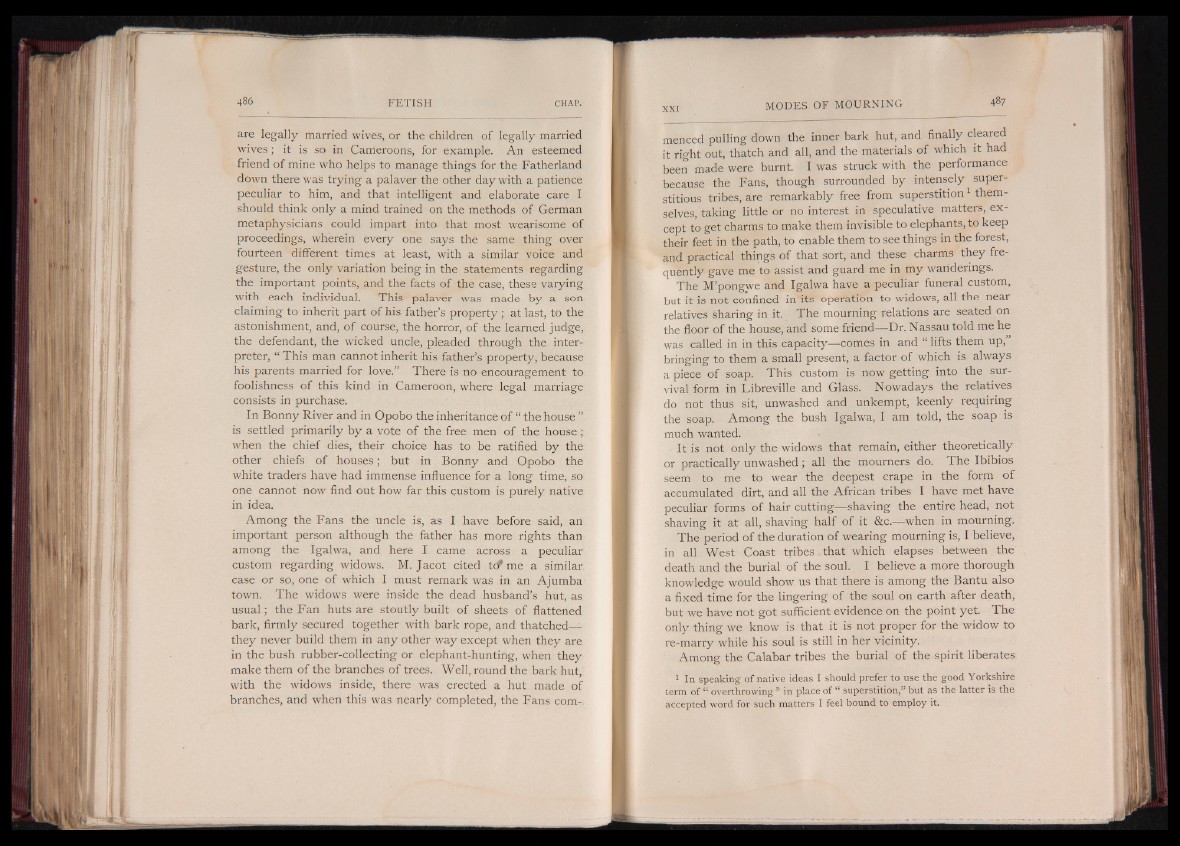
are legally married wives, or the children of legally married
wives; it is so in Cameroons, for example. An esteemed
friend of mine who helps to manage things for the Fatherland
down there was trying a palaver the other day with a patience
peculiar to him, and that intelligent and elaborate care I
should think only a mind trained on the methods of German
metaphysicians could impart into that most wearisome of
proceedings, wherein every one says the same thing over
fourteen different times at least, with a similar voice and
gesture, the only variation being in the statements regarding
the important points, and the facts of the case, these varying
with each individual. This palaver was made by a son
claiming to inherit part of his father’s property; at last, to the
astonishment, and, of course, the horror, of the learned judge,
the defendant, the wicked uncle, pleaded through the interpreter,
“ This man cannot inherit his father’s property, because
his parents married for love.” There is no encouragement to
foolishness of this kind in Cameroon, where legal marriage
consists in purchase.
In Bonny River and in Opobo the inheritance of “ the house ”
is settled primarily by a vote of the free men of the house ;
when the chief dies, their choice has to be ratified by the
other chiefs of houses; but in Bonny and Opobo the
white traders have had immense influence for a long time, so
one cannot now find out how far this custom is purely native
in idea.
Among the Fans the uncle is, as I have before said, an
important person although the father has more rights than
among the Igalwa, and here I came across a peculiar
custom regarding widows. M. Jacot cited tcf me a similar
case or so, one of which I must remark was in an Ajumba
town. The widows were inside the dead husband’s hut, as
usual; the Fan huts are stoutly built of sheets of flattened
bark, firmly secured together with bark rope, and thatched—
they never build them in any other way except when they are
in the bush rubber-collecting or elephant-hunting, when they
make them of the branches of trees. Well, round the bark hut,
with the widows inside, there was erected a hut made of
branches, and when this was nearly completed, the Fans commenced
pulling down the inner bark hut, and finally cleared
it right out, thatch and all, and the materials of which it had
been made were burnt. I was struck with the performance
because the Fans, though surrounded by intensely superstitious
tribes, are remarkably free from superstition1 themselves,
taking little or no interest in speculative matters, except
to get charms to make them invisible to elephants, to keep
their feet in the path, to enable them to see things in the forest,
and practical things of that sort, and these charms they frequently
gave me to assist and guard me in my wanderings.
The M’pongwe and Igalwa have a peculiar funeral custom,
but it is not confined in its operation to widows, all the near
relatives sharing in it. The mourning relations are seated on
the floor of the house, and some friend— Dr. Nassau told me he
was called in in this capacity— comes in and “ lifts them up,”
bringing to them a small present, a factor of which is always
a piece of soap. This custom is now getting into the survival
form in Libreville and Glass. Nowadays the relatives
do not thus sit, unwashed and unkempt, keenly requiring
the soap. Among the bush Igalwa, I am told, the soap is
much wanted.
■ It is not only the widows that remain, either theoretically
or practically unwashed; all the mourners do. The Ibibios
seem to me to wear the deepest crape in the form of
accumulated dirt, and all the African tribes I have met have
peculiar forms of hair cutting— shaving the entire head, not
shaving it at all, shaving half of it &c.— when in mourning.
The period of the duration of wearing mourning is, I believe,
in all West Coast tribes. that which elapses between the
death and the burial o f the soul. I believe a more thorough
knowledge would show us that there is among the Bantu also
a fixed time for the lingering of the soul on earth after death,
but we have not got sufficient evidence on the point yet. The
only thing we know is. that it is not proper for the widow to
re-marry while his soul is still in her vicinity.
Among the Calabar tribes the burial of the spirit liberates
1 In speaking of native ideas I should prefer to use the good Yorkshire
term of - overthrowing ” in place o f (i superstition,” but as the latter is the
accepted word for such matters I feel bound to employ it.